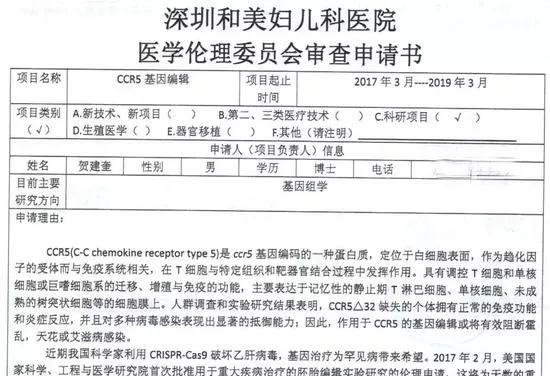I'm not afraid of genetically modified foods, but I'm afraid of genetically modified babies. Of course, gene editing is not a purely transgenic.
People's Daily Shenzhen, November 26 (Lv Shaogang, Chen Yuzhu) On November 26, He Jiankui, a scientist from Shenzhen, China, announced a day before the second International Human Genome Editing Summit that a pair of gene-edited babies named Lulu and Nana were born in China in November. One of the twins' genes was modified to give them a natural resistance to AIDS at birth. This is the world's first gene-edited baby immune to AIDS, which also means that China has achieved a historic breakthrough in the field of gene editing technology for disease prevention. The Editorial Summit was co-organized in Hong Kong on 27-29 November 2018 by the National Academy of Sciences, the National College of Medicine, the Royal Society of London and the Hong Kong Academy of Sciences. According to He Jiankui, gene editing surgery has one more step than conventional IVF, that is, during the fertilized egg stage, the Cas9 protein and a specific guide sequence are injected into the fertilized egg that is still in a single cell with a needle of about 5 microns and about one-twentieth of a hair. His team uses "CRISPR/Cas9" gene-editing technology, which is capable of pinpointing and modifying genes, also known as "gene scalpels." This genetic surgery modified the CCR5 gene, one of the main helper receptors for the HIV virus to invade the body's cells. Previous data showed that about 10% of people in the Nordic population naturally have CCR5 gene deletions. People with this mutation can close the door to the most pathogenic HIV infection, so that the virus cannot invade human cells, that is, they can naturally immunize to the HIV virus.
In medicine, it is naturally good to explore new methods. Choosing HIV immune gene editing is also more flattering. After all, the dangers of AIDS seem too great. If this method is feasible and stable, the treatment of many diseases in the future will become transparent, and the application prospects will be bright. But ethics is a problem, and many people are afraid of making a big leap forward in gene therapy and gene editing, because they are afraid of encountering ethical problems, and indeed there are ethical problems. Therefore, it is very reasonable that an ethics committee that has been called "Putian Hospital" has also been attacked.

And beautiful women and children's hospital a hospital can do ethical review? Many people think it's not enough. The funniest thing is that a reporter called Shenzhen Hemei Women's and Children's Hospital, and the other staff replied that it is currently certain that the project is not carried out in their hospital, and the child is not born in their hospital. Could this news be a complete fake news?
Under a survey under the sina news (http://tech.sina.com.cn/zt_d/jybj/), more than 21,000 people participated in the survey, and nearly 30% supported it. It's about the same as the number of people who don't support it. 4 adults wait and see. In fact, 7 adults do not have a clear attitude. It's really not clear what Pandora's box looks like when it's opened.
This is much more careful to consider than genetically modified foods. The emergence of a genetically modified food that has caused such a great controversy, gene-edited babies, may be the beginning of an era, or it may be the end of an era.
Sina Technology's headline critique article, "The Backlash: Genetically Altered Babies Lead to Widespread Criticism in the Biomedical Community, https://tech.sina.com.cn/d/f/2018-11-26/doc-ihmutuec3757773.shtml also mentions technical risks outside of ethics. Please click carefully to read the original article to view the above article.
In addition to questioning the ethical approval of the clinical trial, the clinical trial was also questioned by peer experts: Is CCR5 an optimal target for gene editing and whether it is necessary to do so? Some scholars believe that there may be other safer solutions for the CCR5 target, because CCR5 itself has a function, and once knocked out, it may pose an unforeseen potential threat to the body. Musunuru believes that while they can fight HIV, at the same time they will be exposed to all other unknown risks. Church believes that knocking out CCR5 will make them more vulnerable to viruses such as the West Nile. Qiu Zilong, a researcher at the Institute of Neuroscience of the Shanghai Institute of Biological Sciences of the Chinese Academy of Sciences, believes that gene editing is used in humans, especially gene editing fertilized eggs, which should be a very cautious measure for scientists around the world. What we see now is directly released news, and the content of scientific research has not been disclosed, and I think it is very sad that the publication of scientific results should not be published in the news media first, and then published in academic journals.
It's really a sad thing.
Before I was ready, I hoped it was fake news about the birth of the gene doll. I really don't want people in China to engage in this gene editing, and they will come up and make big news, big fake news.
Humans don't need a genetic leap forward, take your time, humans can wait.
https://tech.sina.com.cn/d/f/2018-11-26/doc-ihmutuec3783015.shtml
Do you know this about gene editing?
https://tech.sina.com.cn/d/f/2018-11-26/doc-ihmutuec3757773.shtml
Backlash: Genetically altered babies have led to widespread criticism in the biomedical community
http://tech.sina.com.cn/zt_d/jybj/
Two recommended books:
Redesign life
Genetic transmission
November 26, 2018
Old Kang said mobilewtf welcomes to subscribe